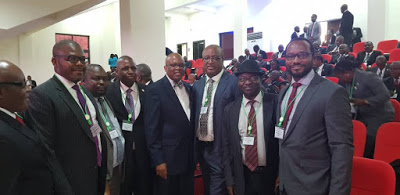
At the last meeting of the Nigerian Bar Association; National Executive Council on the 6th of December,2018, the Honourable President of the Bar, Paul Usoro SAN in his speech, highlighted 5 legal positions on why the EFCC has no business investigating the professional fee of a legal practitioner, especially if neither member of the contract had cried fowl in the first place.
Find the 5 points quoted from the above mentioned speech below-
“(a) Client-Lawyer Privilege. It has judicially and historically been acknowledged that issues of fees, as between a lawyer and his client, is a matter of privilege. The recent decision of the Court of Appeal that was delivered on 14 June 2017 in Appeal Number CA/A/202/2015: Central Bank of Nigeria v Registered Trustees of the Nigerian Bar Association & Attorney General of the Federation affirmed this position. By questioning lawyers on the legitimate fees that they have earned from clients, the EFCC is breaching the lawyer-client privilege and showing complete disregard for the judgments of the Courts in this regard.
(b) EFCC’s lack of Locus Standi in Client-Lawyer Contractual Relationship. The fees that are paid by a Client to his lawyer is not only a matter of privilege but is also contractual. As we all know, non-parties to a contract are complete strangers thereto and lack the locus standi to question and/or determine the propriety of such contract(s). The EFCC stands in that position in this and other matters of this nature; it lacks the locus standi to question the basis for the fees. Only the parties to the contract can question the justification for the fees and in this instance, neither party has raised any such query. Indeed, neither party reported this matter to the EFCC or invited the Agency to carry out any investigation in regard thereto.
(c) EFCC as Auditor and/or Regulator of Legal Fees. There is no provision in Nigeria’s statute books that constitutes the EFCC into the auditor of legal fees. When the EFCC arrogates to itself the right to determine the basis for a lawyer’s fees, it not only intrudes into a client-lawyer contract which by its nature is privileged, but also constitutes itself into an auditor of lawyers’ fees. No such position has been created in our statute books for the EFCC or any other agency for that matter. The EFCC is also not set up as the regulator of lawyers and their fees and it ought not assume such a position.
(d) Criminalization of Lawyers’ Fees. The EFCC appears to be straining quite hard to criminalize the fees that are earned by lawyers for their legitimate work. Mine is not the first of these intrusions; we all recall the case of Chief Mike Ozekhome, SAN when the EFCC attempted to forfeit his fees on the pretext that the funds came from illegal sources. The allegations of the EFCC against me are not any different, particularly in regard to the N300,000,000.00 which was paid by Governor Udom Emmanuel to my Firm’s account for the benefit of his Counsel in the Election Petition Appeal. If these EFCC incursions are not checked, the Bar and the practice of our profession are doomed.
(e) Independence of Legal Profession and Practice. The practice of law, as we all know, is founded on the independence of the legal practitioner and his courage to advocate on behalf of his client to the best of his ability and conviction. That independence and thecourage of the advocate are now being threatened and trampled upon by the EFCC. Lawyers now have to work and walk on tip-toe, looking over their shoulders to determine whether the EFCC would be coming after them solely on account of their courage and independence in advocacy. That does not bode well for the profession or for legal practice generally.”
